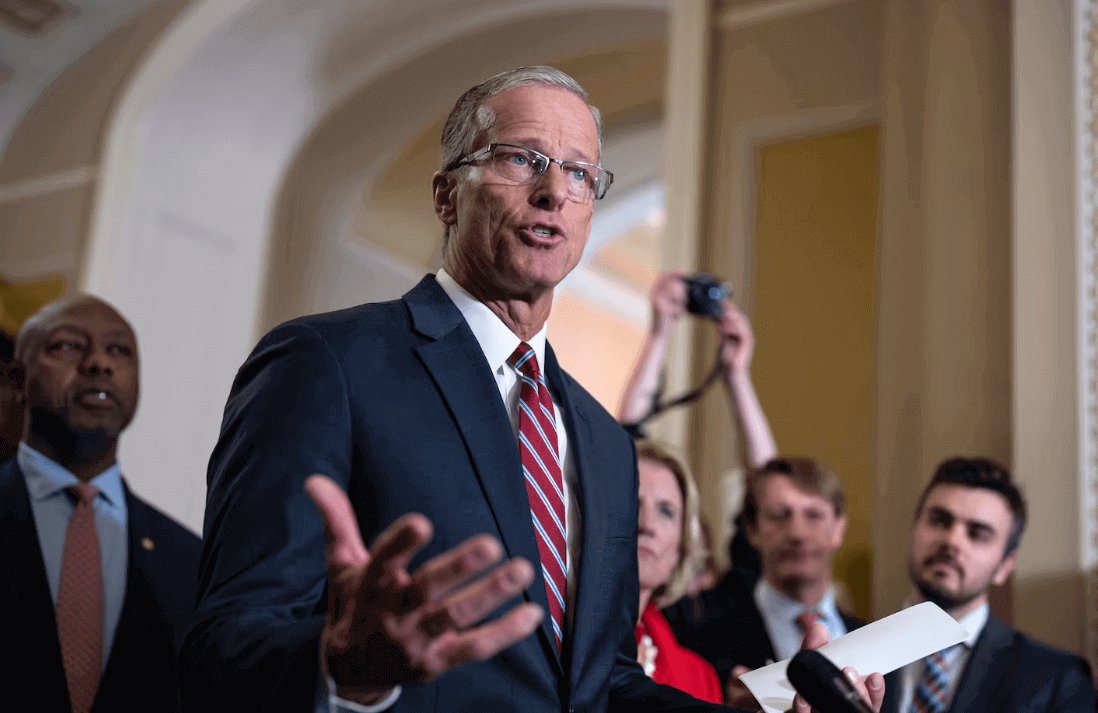共和党参议员选举约翰·图恩为下一任多数党领袖

【中美创新时报2024 年 11 月 14 日编译讯】(记者温友平编译)共和党周三选举南达科他州参议员约翰·图恩担任下一届国会的多数党领袖,他是参议院的二号人物,他们选择了一位党内制度主义者来取代参议院任职时间最长的领导人肯塔基州参议员米奇·麦康奈尔。《纽约时报》记者卢克·布罗德沃特和卡尔·赫尔斯对此作了下述报道。
在提拔 63 岁的图恩时,共和党参议员转向了麦康奈尔模式的传统共和党人,并拒绝了一位更符合当选总统唐纳德·特朗普的“让美国再次伟大”运动的挑战者。
据两位知情人士透露,在以秘密投票方式进行的闭门投票中,图恩以 29 比 24 的票数击败了另一位备受尊敬的共和党建制派参议员、德克萨斯州参议员约翰·科宁。据他们称,佛罗里达州参议员里克·斯科特自诩为特朗普的竞选候选人,并得到了特朗普右翼盟友的支持,但在早些时候的投票中,他因只获得了 13 名支持者而被迫退出竞选,远远落后于图恩和科宁。
图恩获胜后,科宁呼吁他通过鼓掌方式(或无异议或异议)登上领袖位置,此举表明参议院将继续成为喧嚣的 MAGA 运动世界中文明的堡垒。
信息很明确:参议院至少目前仍将是共和党的一个分支,至少在一定程度上独立于特朗普。
多年来,图恩并不是特朗普的唯唯诺诺者。他反对特朗普推翻 2020 年大选结果的努力,并最初支持南卡罗来纳州参议员蒂姆·斯科特获得总统提名。
但在接受提名的演讲中,图恩明确表示,他知道他的工作是通过参议院传达特朗普的立法优先事项。
“我们很高兴重新获得多数席位,并与众议院的同事合作实施特朗普总统的议程,”图恩说,并补充道:“我们将确保总统和他的团队拥有执行边境安全法和清除在我们每个州肆虐的暴力罪犯所需的工具和支持。”
但在他的讲话中,图恩暗示参议院将履行其宪法责任,以制衡总统。他说,他将维持参议院的立法阻挠议事,这意味着如果共和党不向民主党妥协,民主党可以阻止某些立法。他还表示,参议院将继续审查特朗普政府的提名人。但他表示,如果民主党设置太多障碍,他可能会接受特朗普的要求,利用休会期任命来强行通过他那些问题重重的提名人。
“我们希望确保我们的委员会像往常一样举行确认听证会,”图恩说。
除了图恩的胜利外,其他几位共和党参议员也被选为领导团队成员。怀俄明州参议员约翰·巴拉索获得第二名;阿肯色州参议员汤姆·科顿击败爱荷华州参议员乔尼·恩斯特,获得第三名;西弗吉尼亚州参议员雪莱·摩尔·卡皮托获得第四名;俄克拉荷马州参议员詹姆斯·兰克福德和蒂姆·斯科特也当选为领导。
领导层的更替代表了参议院的一个重大时刻,麦康奈尔在参议院几乎毫无挑战地掌权了 18 年。
在麦康奈尔 2007 年上任之前,只有五名共和党参议员(除了图恩和科宁)进入参议院,而且只有少数民主党人在麦康奈尔既不是多数党领袖也不是少数党领袖的参议院任职。麦康奈尔对自己的战略秘而不宣,试图推动他的会议朝着他的方向发展。这种领导风格肯定会改变。
图恩周一在福克斯新闻的一篇评论文章中阐述了自己的观点,他认为参议院共和党人需要履行特朗普对选民的承诺,才能保持多民族、多种族联盟的支持,正是这个联盟把他带入了第二任期。
“如果我们不能实现特朗普总统的优先事项,我们将失去他们的支持,”他写道。“他们信任我们,把选票投给我们。现在我们必须撸起袖子开始工作。”
他还向同事们介绍了开放参议院进行更多辩论和修正案的计划,并表示将定期与众议院议长迈克·约翰逊会面。
这位前总统过去曾抨击图恩拒绝配合特朗普推翻 2020 年大选的企图。特朗普称图恩为“RINO”——名义上的共和党人——并称他为“米奇的儿子”。
他发誓要与图恩在初选中竞争,并承诺结束他的政治生涯。
但图恩一直在努力改善与当选总统的关系。他今年春天访问了海湖庄园,几天前还与特朗普进行了交谈。
虽然特朗普的盟友严厉批评拒绝支持里克·斯科特的参议员,但特朗普可能感觉到斯科特无法获胜,最终没有亲自参与。相反,他拜访了众议院共和党人,并开玩笑说也许他应该获得第三个任期。
在图恩胜选后立即举行的新闻发布会上,新参议院领导团队表示,他们的立场与当选总统的立场几乎没有区别。
“特朗普总统的议程非常明确,”蒂姆·斯科特说。“我们的目标是,与我们的领导人约翰·图恩一起,确保我们实现这些目标。”
本文最初发表于《纽约时报》。
题图:参议院少数党党鞭、南达科他州共和党人约翰·图恩周三在国会大厦当选接替长期担任共和党领袖的肯塔基州共和党人米奇·麦康奈尔后会见了记者。J. Scott Applewhite/美联社
附原英文报道:
Republican senators elect John Thune as next majority leader
By Luke Broadwater and Carl Hulse New York Times,Updated November 13, 2024
Senate Minority Whip John Thune, Republican of South Dakota, met with reporters after he was elected to succeed longtime GOP leader Mitch McConnell of Kentucky, at the Capitol on Wednesday.J. Scott Applewhite/Associated Press
WASHINGTON — Republicans on Wednesday elected Senator John Thune of South Dakota, their No. 2 in the chamber, to serve as majority leader in the next Congress, choosing a party institutionalist to replace Senator Mitch McConnell of Kentucky, the Senate’s longest-serving leader.
In elevating Thune, 63, GOP senators turned to a traditional Republican in the mold of McConnell, and rejected a challenger more aligned with President-elect Donald Trump’s Make America Great Again movement.
In a closed-door vote conducted by secret ballot, Thune emerged victorious by a vote of 29-24 over Senator John Cornyn of Texas, another well-respected establishment Republican, according to two people familiar with the vote. Senator Rick Scott of Florida, who pitched himself as the Trump candidate in the race and had been supported by right-wing allies of the president-elect, was forced out of the contest in an earlier round of voting after drawing just 13 supporters, well behind Thune and Cornyn, they said.
After Thune had won, Cornyn called for him to ascend to the leader position through acclamation — or without objection or dissent — a move that signaled the Senate would remain a bastion of civility in the raucous world of the MAGA movement.
The message was clear: The Senate will remain, at least for now, an arm of the GOP with at least some level of independence from Trump.
Over the years, Thune has been no automatic yes-man to Trump. He opposed Trump’s efforts to overturn the 2020 election and initially endorsed fellow Senator Tim Scott of South Carolina for the presidential nomination.
But in his acceptance speech, Thune made clear he knew it was his job to deliver Trump’s legislative priorities through the Senate.
“We are excited to reclaim the majority and get to work with our colleagues in the House to enact President Trump’s agenda,” Thune said, adding: “We will make sure that the president and his team have the tools and support that they need to enforce border security laws and to remove the violent criminals who are wreaking havoc in every one of our states.”
But in his remarks, Thune suggested the Senate would carry out its constitutional responsibility as a check on the presidency. He said he would maintain the Senate’s legislative filibuster, which would mean that Democrats could block certain legislation if Republicans will not compromise with them. And he said the Senate would continue to vet nominees to Trump’s administration. But he left open the idea he might embrace Trump’s demand to use recess appointments to force through his more troubled nominees should the Democrats throw up too many roadblocks.
“We want to make sure our committees have confirmation hearings like they typically do,” Thune said.
In addition to Thune’s victory, several other Republican senators were voted in as members of the leadership team. Senator John Barrasso of Wyoming captured the No. 2 post; Senator Tom Cotton of Arkansas defeated Senator Joni Ernst of Iowa for the No. 3 position; Senator Shelley Moore Capito of West Virginia took the No. 4 job; and Senators James Lankford of Oklahoma and Tim Scott also were elected to leadership.
The switch in leadership represents a remarkable moment in the Senate, where McConnell has held on to power for 18 years nearly without challenge.
Just five Republican senators besides Thune and Cornyn came to the Senate before McConnell took charge in 2007, and only a handful of Democrats have served in a Senate where McConnell was not either majority or minority leader. McConnell played his strategic cards close to his chest and sought to push his conference in his direction. That leadership style is sure to change.
Thune made his case in an opinion essay on Fox News on Monday, arguing that Senate Republicans needed to fulfill Trump’s promises to voters in order to keep the support of a multiethnic, multiracial coalition that swept him into a second term.
“If we fail to deliver on President Trump’s priorities, we will lose their support,” he wrote. “They have trusted us with their votes. Now we have to roll up our sleeves and get to work.”
He also pitched colleagues on his plans to open up the Senate floor to more debate and amendments and said he would meet regularly with House Speaker Mike Johnson.
The former president has railed against Thune in the past over his refusal to go along with Trump’s attempt to overturn the 2020 election. Trump referred to Thune as a “RINO” — Republican in name only — and called him “Mitch’s boy.”
And he vowed to run a primary opponent against Thune, promising to end his political career.
But Thune has worked to improve his rapport with the president-elect. He visited Mar-a-Lago in the spring and spoke with Trump just days ago.
While allies of Trump lambasted senators who refused to endorse Rick Scott, Trump, perhaps sensing Scott could not win, did not ultimately weigh in himself. Instead he visited with House Republicans, and joked that maybe he should be awarded a third term in office.
At a news conference immediately following Thune’s victory, the new Senate leadership team let it be known there would be little daylight between their positions and the president-elect’s.
“President Trump has been very clear on his agenda,” Tim Scott said. “Our goal, with our leader John Thune, is to make sure that we achieve those objectives.”
This article originally appeared in The New York Times.



